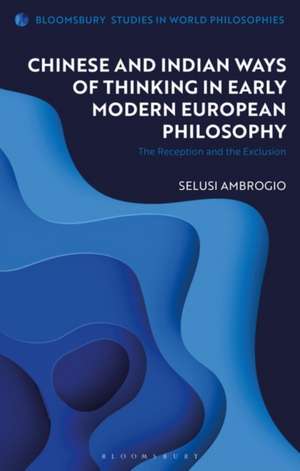Chinese and Indian Ways of Thinking in Early Modern European Philosophy: The Reception and the Exclusion: Bloomsbury Studies in World Philosophies
Autor Selusi Ambrogioen Limba Engleză Paperback – 29 iun 2022
| Toate formatele și edițiile | Preț | Express |
|---|---|---|
| Paperback (1) | 197.86 lei 6-8 săpt. | |
| Bloomsbury Publishing – 29 iun 2022 | 197.86 lei 6-8 săpt. | |
| Hardback (1) | 569.13 lei 6-8 săpt. | |
| Bloomsbury Publishing – 9 dec 2020 | 569.13 lei 6-8 săpt. |
Preț: 197.86 lei
Preț vechi: 257.92 lei
-23% Nou
Puncte Express: 297
Preț estimativ în valută:
37.86€ • 39.31$ • 31.57£
37.86€ • 39.31$ • 31.57£
Carte tipărită la comandă
Livrare economică 25 martie-08 aprilie
Preluare comenzi: 021 569.72.76
Specificații
ISBN-13: 9781350191419
ISBN-10: 1350191418
Pagini: 256
Dimensiuni: 156 x 234 x 19 mm
Greutate: 0.35 kg
Editura: Bloomsbury Publishing
Colecția Bloomsbury Academic
Seria Bloomsbury Studies in World Philosophies
Locul publicării:London, United Kingdom
ISBN-10: 1350191418
Pagini: 256
Dimensiuni: 156 x 234 x 19 mm
Greutate: 0.35 kg
Editura: Bloomsbury Publishing
Colecția Bloomsbury Academic
Seria Bloomsbury Studies in World Philosophies
Locul publicării:London, United Kingdom
Caracteristici
Offers fresh insights into the origins of the enduring parochial attitude of Western philosophy and why it became Eurocentric
Notă biografică
Selusi Ambrogio is Adjunct Lecturer of Chinese Philosophy and Chinese Literature at the University of Macerata and the University of Urbino, Italy.
Cuprins
List of AbbreviationsAcknowledgements General Introduction Preliminary Note to Some Terms 1. India and Chinese Philosophy in the Late-16th Century Europe2. The Rise of the Myth of an Asiatic Atheism 3. The Exclusion of Asian Philosophical Thought in Europe ConclusionBibliography Primary Sources Secondary sourcesIndex
Recenzii
This is a noteworthy contribution to the intercultural study of the history of philosophy and the early modern formation of the idea of philosophy as an exclusively European project. This work will inform its readers of less recognized episodes in that history as well as inspire them to rethink the modern Western-centered conception of philosophy and its history.
Finally some news on "Orientalism before the birth of Orientalism": this genealogical investigation into the roots of the Eurocentric prejudice against Indian and Chinese philosophical traditions, which is led with maestria by a young Italian scholar trained both as a philosopher and a sinologist, shows that it wasn't entirely the fault of Hegel after all.
The rejection by Western philosophers of Indian and Chinese thoughts is often situated in the Nineteenth century. Through this very well documented study, Selusi Ambrogio demonstrates that the rejection took already roots in the Seventeenth century and was fully in place in the Eighteenth century, explaining very methodically the complex reasons for this exclusion. His analysis invites us to rethink what should be a philosophy which truly includes India, China and other traditions in the 20th century.
Finally some news on "Orientalism before the birth of Orientalism": this genealogical investigation into the roots of the Eurocentric prejudice against Indian and Chinese philosophical traditions, which is led with maestria by a young Italian scholar trained both as a philosopher and a sinologist, shows that it wasn't entirely the fault of Hegel after all.
The rejection by Western philosophers of Indian and Chinese thoughts is often situated in the Nineteenth century. Through this very well documented study, Selusi Ambrogio demonstrates that the rejection took already roots in the Seventeenth century and was fully in place in the Eighteenth century, explaining very methodically the complex reasons for this exclusion. His analysis invites us to rethink what should be a philosophy which truly includes India, China and other traditions in the 20th century.









